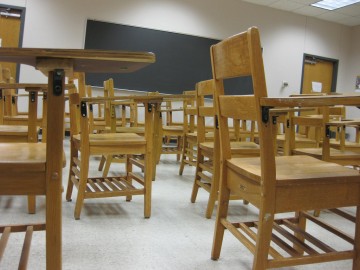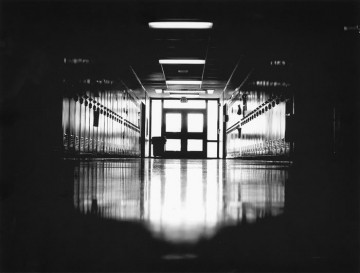Why Worcester School Suspensions Dropped by 20 Percent
Wednesday, May 02, 2012

The answer might be a little bit of both.
“I do believe the current administration and the state look askance at suspensions. They may be overused,” said School Committee member Brian O’Connell. “But a significant part of that, I take, is greater tolerance and a greater reluctance to suspend.”
Schools, O’Connell acknowledged, may be leery of being seen as troubled institutions. A large number of suspensions could draw a watchful eye from the state. Worcester appears to moving further from view; in the last five years suspensions have dropped by about 20 percent. In 2005, Worcester principals issued 4995 to students compared to 4072 in the 2010-2011 school year.
Suspensions on decline
There are two types of suspensions students can receive, an in-school suspension and an out-of-school suspension. Statistics compiled by the Massachusetts Department of Elementary and Secondary Education (DESE) show in-school suspensions in the Worcester school district have seen the sharpest decline. In the 2005-06 school year, there were 2,256 in-school (also referred to as in-house) suspensions. In 2010-11 there were 1,488, a difference of 768. Over that same period, out-of-school suspensions dipped by 155, from 2,739 to 2,584.
Schools are definitely encouraged to try other solutions to suspensions, according to JC Considine, DESE spokesman, who said, “School discipline is a local matter. We urge districts that suspend or remove students for disciplinary reasons to offer some type of alternative education wherever possible. Local educational leaders should determine how this might be delivered, whether in an alternative setting, school or program, or through home tutoring.”
As for the accuracy of data such as the number of suspensions, Considine said it is up to school districts to “report data accurately and comprehensively.”

Alternative methods
In Worcester, one of the alternatives to suspension has been the Positive Behavior Interventions and Support system, or PBIS. Rather than emphasize punishment, the PBIS system focuses on good behavior. Students are rewarded when the follow the rules. The system is in place at three middle schools and 21 elementary schools in Worcester as well as with three alternative programs.
“Everything is laid out for them and what they have to do,” School Committee member and former principal John Monfredo said. “Schools are trying to accentuate the positive in hopes of getting kids to follow the rules. I think all of us need to understand that for our kids to learn, they’ve got to be in school.”
That focus has led to a dramatic shift away from how schools used to confront unruly behavior.
Zero tolerance
“Years back, there was a strong zero-tolerance policy,” said O’Connell. “Suspensions were very much a part our disciplinary (system). My perception is the school chooses more to handle those matters internally, now.”
That is just fine with Monfredo, who is admittedly “big on positive reinforcement.” Rather than nabbing students in the act of doing something wrong, he said, “We’re trying to capture the kids when they’re doing something right. We’re asking, ‘What can we do to turn the child around?’”
“Zero tolerance” has not disappeared, according to Dr. Jeffrey Mulqueen, chief academic officer for Worcester schools. It’s just that it “led to a little bit of a misunderstanding,” he said. “We do have zero tolerance for certain behavior, but there’s a range of ways we deal with that now.”
In years past, Mulqueen said, “There was a pretty tough line taken around certain actions and the consequences that would follow. It’s important to emphasize that disciplines like suspensions don’t have to be a regular part of the school day. In some people’s minds, it’s a given that students are going to be acting out and see consequences like suspensions."
State legislation

The Joint Committee on Education, for example, has filed “An Act Relative to Dropout Prevention and Recover,” also known as the “Dropout Prevention and Recovery Act.”
In part, the bill requires a school principal to provide written notification of the reason for suspension (or expulsion) to the student and parent or guardian. It must be offered both in English and in the primary language of the student’s home. The student would be allowed to meet with the principal or headmaster to “discuss the charges and reasons for suspension or expulsion prior to the suspension or expulsion taking effect.” Every effort must be made to include the parent or guardian in the meeting, according to the bill.
Many schools already take that step with suspensions and while some also do so for detentions, Mulqueen acknowledged detentions are done at the school building level and those policies are up to the individual principal.
The main function of the bill is to reduce the state’s dropout rate, according to State Sen. Sonia Chang-Diaz, D-Boston, Senate chair of the Joint Committee on Education. Targeting suspensions and expulsions is important, she said, because both are “strong predictors of dropping out.”
More than 8,000 kids in Massachusetts drop out of school each year, said Chang-Diaz. Cities like Worcester, where suspension numbers have been decreasing, are headed in the right direction to keep students in school.
“There are situations when suspensions and expulsions are an appropriate response,” Chang-Diaz said. “We want to push all school districts to pursue other alternatives whenever possible.”
Better resolutions
In terms of the overall decline in suspensions throughout the school district, it isn’t a matter of schools becoming more lax or more tolerant of bad student behavior, Mulqueen said. In fact, he added, it’s the opposite: “Schools have gotten much better at addressing these issues. If we just use the one-size-fits-all method, I think miss an opportunity with our students.
“We’re also learning when we provide positive support students are more successful at learning and behaving in a more appropriate manner.”
There are critics of so-called “positive reinforcement,” one of them being Domenick Maglio, an author and owner/director of Wider Horizons School in Spring Hill, Fla. Maglio has written extensively about what he calls the “myth of positive reinforcement as the panacea of raising children.” But he also is no fan of school suspensions.
“Suspensions very often do not work,” Maglio told GoLocalWorcester. “Suspensions aren’t really good indicators at how good a job a school is doing with disciplining and teaching its students. A better indicator is the academic success of the school.”
Still, he continued, those that focus only on positive reinforcement are not doing their students any favors.
“I really have some serious qualms about how people use positive reinforcement,” he said. “In terms of general academics, it hasn’t worked, because schools have gone downhill, rather than downhill over the past 30 or 40 years.”
Good or bad
There are still times when a suspension can and should be used, according to O’Connell. “I think a suspension that is placing students out of a school environment entirely is counter-productive, but if it places them in a discipline-focused environment, it is a good thing,” he said.
Monfredo agrees with making sure kids aren’t entirely removed from an academic setting.
“My mantra is you really want to keep kids in school,” he said. “We’ve got to make sure that child is in school. There is an accountability factor involved. As a former principal, I would do anything in my power to make sure the student stays in school.”
Related Articles
- John Monfredo: Anti-Bullying Programs a Must for Worcester Schools
- Worcester Schools Host Special Olympics
- Worcester Schools Spend Millions Writing Unemployment Checks




 Delivered Free Every
Delivered Free Every
Follow us on Pinterest Google + Facebook Twitter See It Read It